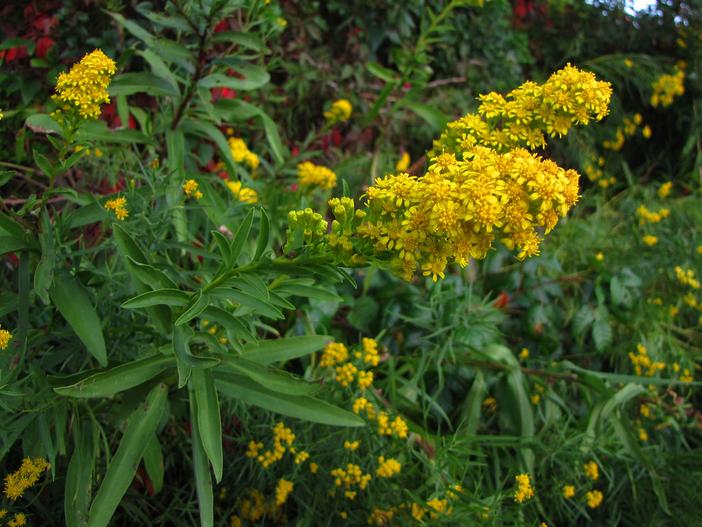Seaside Goldenrod
(Solidago sempervirens)
Seaside Goldenrod (Solidago sempervirens)
/
/

Katja Schulz
CC BY 2.0
Image By:
Katja Schulz
Recorded By:
Copyright:
CC BY 2.0
Copyright Notice:
Photo by: Katja Schulz | License Type: CC BY 2.0 | License URL: https://creativecommons.org/licenses/by/2.0/ | Uploader: treegrow | Publisher: Flickr








































































Estimated Native Range
Summary
Solidago sempervirens, commonly known as Seaside Goldenrod, is an evergreen perennial herb that thrives in coastal dunes, salt marsh edges, and beach fronts along the eastern coast of the USA, extending to Northern Mexico and Southern Canada. It is not a succulent, but rather a hardy plant adapted to harsh seaside conditions, reaching heights of 4–6 feet (120–180 cm). Seaside Goldenrod is distinguished by its smooth, hairless leaves that are thicker and less toothed than those of most other Solidago species, which helps reduce water loss. The plant features showy yellow flower heads arranged in a large, arching, paniculiform inflorescence that blooms from late summer into fall, providing a vital nectar source for pollinators when few other flowers are available.
Seaside Goldenrod is valued for its bright yellow flowers and ability to thrive in challenging coastal environments. It is used in native plant gardens, coastal restoration projects, and as an ornamental in seaside-themed landscapes. It is well-suited for urban planting in coastal cities due to its high salinity tolerance and ability to stabilize sandy soils. This species requires minimal maintenance, preferring full sun and well-drained, sandy soils. While it is generally pest-free, it can be susceptible to rust and mildew in humid conditions. Seaside Goldenrod can spread aggressively in garden settings, so it may require management to keep it in check.CC BY-SA 4.0
Seaside Goldenrod is valued for its bright yellow flowers and ability to thrive in challenging coastal environments. It is used in native plant gardens, coastal restoration projects, and as an ornamental in seaside-themed landscapes. It is well-suited for urban planting in coastal cities due to its high salinity tolerance and ability to stabilize sandy soils. This species requires minimal maintenance, preferring full sun and well-drained, sandy soils. While it is generally pest-free, it can be susceptible to rust and mildew in humid conditions. Seaside Goldenrod can spread aggressively in garden settings, so it may require management to keep it in check.CC BY-SA 4.0
Plant Description
- Plant Type: Herb
- Height: 2-6 feet
- Width: 2-3 feet
- Growth Rate: Moderate
- Flower Color: Yellow
- Flowering Season: Summer
- Leaf Retention: Evergreen
Growth Requirements
- Sun: Full Sun
- Water: Medium, High
- Drainage: Fast, Medium
Common Uses
Bee Garden, Bird Garden, Butterfly Garden, Deer Resistant, Drought Tolerant, Fire Resistant, Hummingbird Garden, Low Maintenance, Rabbit Resistant, Salt Tolerant, Showy Flowers, Street Planting, Water Garden
Natural Habitat
Coastal dunes, salt marsh edges, and beach fronts
Other Names
Common Names: Salt-Marsh Goldenrod , Verge D’Or Toujours Verte , Espiga De Oro , Lluvia De Oro
Scientific Names: Solidago sempervirens , Solidago lithospermifolia , Solidago azorica , Solidago laevigata , Solidago integrifolia , Solidago limonifolia , Solidago arinata , Solidago carnosa , Solidago elata , Solidago noveboracensis
GBIF Accepted Name: Solidago sempervirens L.